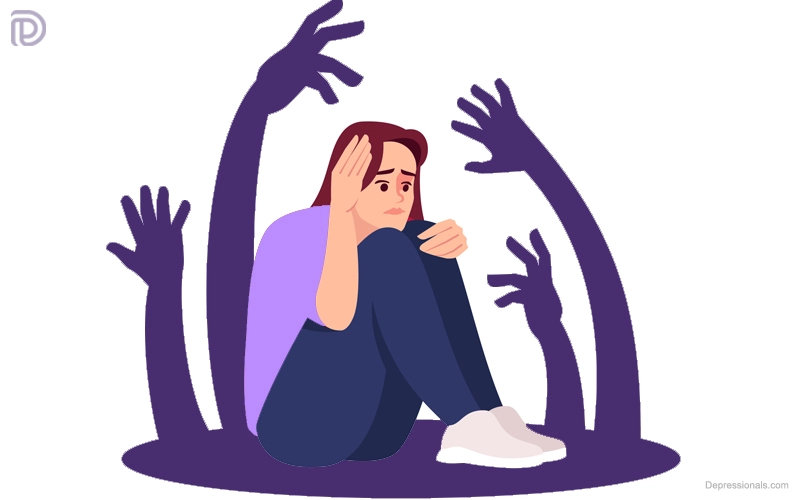What is schizotypal personality disorder?
Schizotypal personality disorder is a form of eccentric personality disorder (STPD). STPD members may appear strange to others because they display strange behavior and mannerisms. People with STPD don’t usually suffer from psychosis, even though they are on the schizophrenia spectrum.
Schizotypal personality disorder sufferers may not be capable or even require close relationships.
People often describe them as bizarre or eccentric. It is possible that they are suspicious and paranoid. Whenever they go out, they seem stiff and out of place.
Read: Agoraphobia
Difference between schizoid and schizotypal personality disorders
Both disorders fall under Cluster A and are characterized as eccentric and odd. There is a significant difference between schizoid personality disorder and schizotypal personality disorder. People with schizotypal personality disorder tend to feel paranoid and suspicious all the time.
Schizotypal personality disorder vs. schizophrenia
The schizotypal personality disorder may cause people to hold odd beliefs or superstitions. They tend to distort reality and have difficulty forming close relationships. Schizophrenia is a serious brain disorder that changes the way a person thinks, acts, expresses emotions, perceives reality, and arranges relationships. An individual with schizophrenic personality disorder may look like someone with a mild form of schizophrenia.
There is a disconnect between reality and the lives of people with schizophrenia. Delusions are visions or sounds that aren’t real (hallucinations). Schizotypal personalities do not.
Schizophrenia may develop in people with schizotypal personality disorder in extremely rare cases.
What are the signs and symptoms of STPD?
The interaction between individuals with schizotypal personality disorders is extremely uncomfortable for them. Individuals with a schizotypal personality disorder do not grow more comfortable with time like people with social anxiety disorder, who may become more comfortable as time progresses.
The disorder also leads to distorted thinking and exaggerated behavior, which often results in further feelings of isolation.
There are several symptoms of STPD, including:
- Unusual thinking or behavior
- Unusual beliefs
- Uncomfortable social situations
- Irresponsible emotional responses or a lack of emotion
- Unusual or rambling speech
- Friendships are few and far between
- Anxiety about social situations
- Paranoia
STPD patients tend to live solitary lives. Building relationships may be difficult if you suffer from intense social anxiety. If you are uncomfortable in social situations, you may blame others.
Psychotic symptoms are rare in people with STPD. Loss of association with reality, hallucinations, and delusions are hallmarks of psychosis. A delusion is a false belief that is fixed in place. There are still often references in their minds.
The idea of reference refers to a person’s incorrect interpretation of a certain incident or external event they believe has special meaning. The meaning of reference may be general or specific to an individual.
Also, check: Stranger Anxiety
Which factors increase the risk?
Families with STPD often have a history of the disorder. There is a possibility that you are at risk if your relative:
- Schizophrenia
- Schizotypal personality disorder
- Another personality disorder
A variety of factors, including childhood experiences, may contribute to this disorder. Factors such as these include:
You should know about Toxic Relationships
Causes of SPD
Schizotypal personality disorder is present in 0.6% of the Norwegian population, but only 4.6 percent of the population in the United States, according to community studies.
Psychotic disorders aren’t caused by any single factor. However, genetic factors appear to play a significant role.
The risk of developing schizotypal personality disorder increases when an individual has first-degree biological relatives with schizophrenia.
Recommended: How to help someone with Depression
What is the diagnosis of STPD?
STPD is often diagnosed in early adulthood. You’ll first have a physical examination if your doctor suspects you have the disease to rule out any underlying medical conditions. They’ll also inquire about your symptoms and if there are any other family members with personality disorders.
Psychiatrists and psychologists can conduct an assessment of your mental health. Your questions will probably revolve around:
- When you began experiencing symptoms
- What affects your daily life as a result of your symptoms
- Feelings in social situations
- School and work experiences
- Your childhood
You may be asked by a psychiatrist or psychologist if you have ever considered harming yourself or others. Your family members may be asked about your behavior as well. They will be able to formulate a diagnosis based on your answers.
Check: Types of Overthinking
DSM-5 diagnostic criteria
Diagnostic and statistical manual, fifth edition: Symptoms must appear in early adulthood. The following symptoms must be present for an individual to be diagnosed:
- Referential errors (interpretation of events or incidents as having a particular meaning unique to the individual)
- An outlandish belief or magical thinking that contradicts subcultural norms or influences behavior
- Perceptions, such as bodily illusions, that are unusual
- Weird thinking and strange speech
- Suspicion and paranoia
- Constricted and inappropriate affect
- Behaviors or appearances that are strange, odd or eccentric
- Insufficient friends or confidants besides first-degree relatives
- Overwhelming social anxiety, which doesn’t diminish with familiarity, as well as fear-based paranoia rather than a sense of negative judgment of oneself
Childhood or adolescence can be affected by these symptoms. During childhood, children may display the following symptoms:
- Peer relations are poor
- Isolation and social anxiety
- Inadequate school performance
- Hypersensitivity
- Language and thoughts that are peculiar
- Fantasies bizarre
Schizotypal personality disorder treatment

Schizotypal personality disorder is not curable, as are other personality disorders. People with personality disorders will likely experience their symptoms all their lives. The symptoms can’t always be reduced, however, or your functioning can be enhanced.
The majority of people with schizotypal personality disorder suffer from depression at some point in their lives. It is also possible that individuals seek treatment to alleviate symptoms of their depression rather than for symptoms related to personality disorders.
A combination of psychotherapy and medication may be used to treat schizotypal personality disorder. CBT can be used to correct incorrect thinking patterns and to improve social skills. Problematic behavior can also be addressed with it.
Additionally, family therapy can be used to assist family members in understanding the symptoms and being more supportive of their loved ones.
Schizotypal personality disorder cannot be treated with a specific medication, but depression, anxiety, and psychotic symptoms can be managed with medication. The effects of certain medications on distortions of thinking may be reduced.
Recommended: How to Deal with Social Anxiety
The coping process
Schizotypal personality disorder can be coped with through positive life experiences. SPD sufferers benefit from forming relationships, regardless of how difficult it is to do.
Furthermore, feeling accomplished can also help ease symptoms. It can be helpful to get a job, volunteer, attend school, or get involved in a community activity.
Complications
There is an increased risk of the following for people with schizotypal personality disorder:
- Depression
- Anxiety
- Other personality disorders
- Schizophrenia
- Psychotic episodes that occur temporarily as a result of stress
- Drug or alcohol abuse
- Suicide attempts
- Problems at work, school, in relationships, and in social settings
Prevention
Schizotypal personality disorder is generally not preventable, but treatment can teach people who tend to suffer from this condition how to change unhelpful thoughts and behaviors in more productive ways.
What are the long-term prospects?
STPD is a chronic disorder. Lifelong treatment is usually necessary for this condition. Depending on how severe your symptoms are, your outlook will vary. You may have more success with treatment if you receive it early.
People with STPD are more likely to develop a major depressive disorder or other personality disorders. Whenever you suspect you are dealing with depression or other mental disorders, you should seek medical assistance.






Hey! Would you mind if I share your blog with my twitter group? There’s a lot of folks that I think would really enjoy your content. Please let me know. Thank you
I was suggested this blog through my cousin. I’m now not sure whether this post is written by means of him as no one else recognise such detailed approximately my problem. You’re incredible! Thanks!
Heya i am for the first time here. I came across this board and I find It truly useful & it helped me out much. I hope to give something back and help others like you helped me.
Hi, Neat post. There is an issue together with your website in internet explorer, would test this?IE nonetheless is the marketplace leader and a good component of folks will leave out your magnificent writing due to this problem.
Hello there! This is kind of off topic but I need some help from an established blog. Is it tough to set up your own blog? I’m not very techincal but I can figure things out pretty fast. I’m thinking about making my own but I’m not sure where to begin. Do you have any points or suggestions? Thanks
Its like you read my mind! You seem to know a lot about this, like you wrote the book in it or something. I think that you can do with some pics to drive the message home a bit, but instead of that, this is fantastic blog. A great read. I will definitely be back.
I really appreciate the kind of topics post here. Thanks for sharing us a great information that is actually helpful. Good day!
Glad to be one of several visitants on this awe inspiring internet site : D.
This is the right blog for anyone who wants to find out about this topic. You realize so much its almost hard to argue with you (not that I actually would want…HaHa). You definitely put a new spin on a topic thats been written about for years. Great stuff, just great!